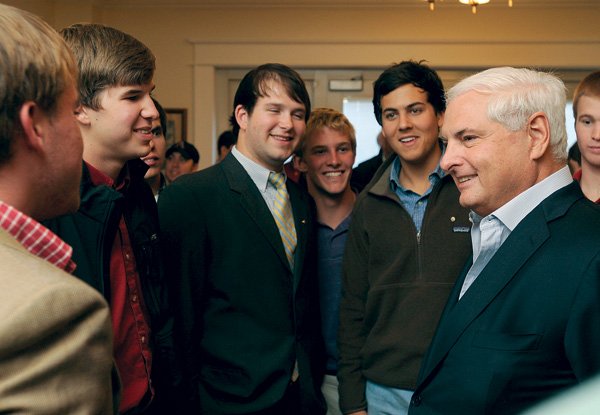FAYETTEVILLE — Panama’s president, Ricardo Martinelli, spoke to members of the Sigma Nu Fraternity on Saturday about the lessons he’s learned in life.
The University of Arkansas graduate won the presidential election in Panama last year by gaining 61 percent of the vote.
“The first time I ran for president, I ended up dead last with only 5 percent of the vote,” he said. “After that, I changed everything I was doing.”
Martinelli, 57, said he learned to never give up while attending the UA.
He recalled a boxing match against a university football player nearly 38 years ago, during which he lost all three rounds.
“He almost killed me in the first round,” Martinelli said. “I still got beat in the second and third round. When I finished the fight, the football player lifted my hand in the air. From that day on, no one bothered me.”
Sigma Nu Alum John Mason said he met Martinelli while attending business school. The two formed an immediate bond and ended up as college roommates.
Mason recalled the early signs of Martinelli’s professional determination during a trip to the grocery store.
“We went to the supermarket to get the basics, but when I was ready to check out, I realized Ricardo was missing,” he said. “I looked up and down the aisles and found him all the way in the back, checking out a can of green beans.”
Martinelli later opened Super Mercados 99, the largest supermarket chain in Panama.
“It just goes to show that you can never start too young,” Mason said.
A native of Panama, Martinelli attended middle and secondary school in the U.S. He earned his bachelor of business administration in 1973, then pursued a master’s degree in finance from Central American Institute of Business Administration in San Jose, Costa Rica. He began his first career with Citibank in Panama.
“I remember having a fight with my superior over approving a loan,” Martinelli recalled. “I said ‘No,’ but he didn’t agree with me. After that, I quit. It’s important that you always follow your instincts, no matter how difficult the decision might be.”
After getting married and having a child, Martinelli accepted a job from a former bank client at a small retail store. He had previously loaned the owner of company $1 million. Soon after he accepted the job, however, he realized the company was in financial trouble.
“Even though I wasn’t on the best terms with Citibank, I still went back and told all the bankers the truth,” he said. “Because of that, I was able to get an extension of the loan and start the company all over again.”
Martinelli bought the company in 1986. Three years later, seven of the nine stores were looted and he had to rebuild the business.
Since then, his company has expanded to 35 stores and 4,400 employees, generating a profit of $25 million.
Martinelli said he started his career in government by talking politics with friends. The conversations led him to accept a leadership position over Panama’s social security system, which he eventually transformed.
“It took a lot of courage to go against the system, but I had to follow my instincts,” he said. “The system isn’t always right.”
In 1999, he was appointed by the president of Panama to serve as minister for Canal Affairs and chairman of the Panama Canal Authority, in which he was instrumental in the transition of the Panama Canal from the U.S. to Panama.
After losing his first presidential election, Martinelli decided to change his image so more people would relate to him. He began wearing jeans, driving a tractor, working on construction sights and collecting trash. He also established a $2 million scholarship fund for needy students.
“I’ve learned that if you’re doing something wrong, change,” Martinelli said. “I changed the way I wanted to convey my message. It’s important that you learn to accept criticism and admit when you’re wrong. Never blame your mistakes on others.”
Since being elected president, he’s transformed the country by building airports, highways and a metro system. He’s also restored law and order by reforming Panama’s tax system. The country now has a 1.5 percent deficit, compared to 14 percent in America.
Currently, Martinelli is overseeing the $5.25 billion expansion of the Panama Canal to increase capacity and accommodate larger ships.
“You have to bust your butt every day to obtain what you want in life,” he said. “If you have to fight the whole world to do something that’s right, do it. In Panama, we are truly doing good things. But, I wouldn’t be able to do it if I didn’t fight one more round.”
***
At A Glance
Panama
Panama is situated on the isthmus connecting North and South America. It was settled by the Spanish in the 16th century. Panama broke with Spain in 1821 and joined a union of Colombia, Ecuador, and Venezuela — named the Republic of Gran Colombia. When the union dissolved in 1830, Panama remained part of Colombia. With U.S. backing, Panama seceded from Colombia in 1903. The Panama Canal was built by the U.S. Army Corps of Engineers between 1904 and 1914. The country has one of the fastest growing economies in Central America.
Source: Authority of Tourism Panama

